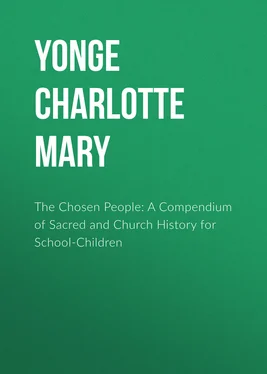Charlotte Yonge - The Chosen People - A Compendium of Sacred and Church History for School-Children
Здесь есть возможность читать онлайн «Charlotte Yonge - The Chosen People - A Compendium of Sacred and Church History for School-Children» — ознакомительный отрывок электронной книги совершенно бесплатно, а после прочтения отрывка купить полную версию. В некоторых случаях можно слушать аудио, скачать через торрент в формате fb2 и присутствует краткое содержание. Жанр: foreign_prose, foreign_religion, Философия, foreign_psychology, foreign_antique, на английском языке. Описание произведения, (предисловие) а так же отзывы посетителей доступны на портале библиотеки ЛибКат.
- Название:The Chosen People: A Compendium of Sacred and Church History for School-Children
- Автор:
- Жанр:
- Год:неизвестен
- ISBN:нет данных
- Рейтинг книги:4 / 5. Голосов: 1
-
Избранное:Добавить в избранное
- Отзывы:
-
Ваша оценка:
- 80
- 1
- 2
- 3
- 4
- 5
The Chosen People: A Compendium of Sacred and Church History for School-Children: краткое содержание, описание и аннотация
Предлагаем к чтению аннотацию, описание, краткое содержание или предисловие (зависит от того, что написал сам автор книги «The Chosen People: A Compendium of Sacred and Church History for School-Children»). Если вы не нашли необходимую информацию о книге — напишите в комментариях, мы постараемся отыскать её.
The Chosen People: A Compendium of Sacred and Church History for School-Children — читать онлайн ознакомительный отрывок
Ниже представлен текст книги, разбитый по страницам. Система сохранения места последней прочитанной страницы, позволяет с удобством читать онлайн бесплатно книгу «The Chosen People: A Compendium of Sacred and Church History for School-Children», без необходимости каждый раз заново искать на чём Вы остановились. Поставьте закладку, и сможете в любой момент перейти на страницу, на которой закончили чтение.
Интервал:
Закладка:
They had enormous idols hewn out of stone. The head of one, which you may see in the British Museum, is far taller than the tallest man, and yet the face is really handsome, and there are multitudes more, both of them and of their temples, still remaining on the banks of the Nile. The children of Israel, being chiefly shepherds, kept apart from the Egyptians at first; but as time went on they learnt some of their habits, and many of them had begun to worship their idols and forget the truth, when their time of affliction came. The King of Egypt, becoming afraid of having so numerous and rich a people settled in his dominions, tried to keep them down by hard bondage and heavy labour. He made them toil at his great buildings, and oppressed them in every possible manner; and when he found that they still throve and increased, he made the cruel decree, that every son who was born to them should be cast into the river.
But man can do nothing against the will of God, and this murderous ordinance proved the very means of causing one of these persecuted Hebrew infants to be brought up in the palace of Pharaoh, and instructed in all the wisdom of the Egyptians, the only people who at that time had any human learning. Even in his early life, Moses seems to have been aware that he was to be sent to put an end to the bondage of his people, for, choosing rather to suffer with them than to live in prosperity with their oppressors, he went out among them and tried to defend them, and to set them at peace with one another; but the time was not yet come, and they thrust him from them, so that he was forced to fly for shelter to the desert, among the Midianite descendants of Abraham. After he had spent forty years there as a shepherd, God appeared to him, and then first revealed Himself as JEHOVAH, the Name proclaiming His eternal self-existence, I AM THAT I AM, a Name so holy, that the translators of our Bible have abstained from repeating it where it occurs, but have put the Name, the LORD, in capital letters in its stead. Moses was then sent to Egypt to lead out the Israelites on their way back to the land so long promised to their fore-fathers; and when Pharaoh obstinately refused to let them go, the dreadful plagues and wonders that were sent on the country were such as to show that their gods were no gods; since their river, the glory of their land, became a loathsome stream of blood, creeping things came and went at the bidding of the Lord, and their adored cattle perished before their eyes. At last, on the night of the Passover, in each of the houses unmarked by the blood of the Lamb, there was a great cry over the death of the first-born son; and where the sign of faith was seen, there was a mysterious obedient festival held by families prepared for a strange new journey. Then the hard heart yielded to terror, and Israel went oat of Egypt as a nation. They had come in in 1707 as seventy men, they went out in 1491 as six hundred thousand, and their enemies, following after them, sank like lead in the mighty waters of that arm of the Red Sea, which had divided to let the chosen pass through.
LESSON IV
THE WILDERNESS
"Where Is He that brought them up out of the sea with the shepherd of His flock? Where is He that put His Holy Spirit within him?"— Isaiah , lxiii. 11.
When Moses had led the 600,000 men, with their wives, children, and cattle, beyond the reach of the Egyptians, they were in a small peninsula, between the arms of the Red Sea, with the wild desolate peaks of Mount Horeb towering in the midst, and all around grim stony crags, with hardly a spring of water; and though there were here and there slopes of grass, and bushes of hoary-leaved camel-thorn, and long-spined shittim or acacia, nothing bearing fruit for human beings. There were strange howlings and crackings in the mountains, the sun glared back from the arid stones and rocks, and the change seemed frightful after the green meadows and broad river of Egypt.
Frightened and faithless, the Israelites cried out reproachfully to Moses to ask how they should live in this desert place, forgetting that the Pillar of cloud and fire proved that they were under the care of Him who had brought them safely out of the hands of their enemies. In His mercy God bore with their murmurs, fed them with manna from Heaven, and water out of the flinty rock; and gave them the victory over the Edomite tribe of robber Amalekites at Rephidim, where Joshua fought, and Moses, upheld by Aaron and Hur, stretched forth his hands the whole day. Then, fifty days after their coming out of Egypt, He called them round the peak of Sinai to hear His own Voice proclaim the terms of the new Covenant.
The Covenant with Abraham had circumcision for the token, faith as the condition, and the blessing to all nations as the promise. This Covenant remained in full force, but in the course of the last four hundred years, sin had grown so much that the old standard, handed down from the patriarchs, had been forgotten, and men would not have known what was right, nor how far they fell from it, without a written Law. This Law, in ten rules, all meeting together in teaching Love to God and man, commanded in fact perfection, without which no man could be fit to stand in the sight of God. He spoke it with His own Mouth, from amid cloud, flame, thunder, and sounding trumpets, on Mount Sinai, while the Israelites watched around in awe and terror, unable to endure the dread of that Presence. The promise of this Covenant was, that if they would keep the Law, they should dwell prosperously in the Promised Land, and be a royal priesthood and peculiar treasure unto God, They answered with one voice, "All the words the Lord hath said will we do;" and Moses made a sacrifice, and sprinkled them with the blood, to consecrate them and confirm their oath. It was the blood of the Old Testament. Then he went up into the darkness of the cloud on the mountain top, there fasting, to talk with God, and to receive the two Tables of Stone written by the Finger of God. This was, as some believe, the first writing in the letters of the alphabet ever known in the world, and the Books of Moses were the earliest ever composed, and set down with the pen upon parchment.
Those Laws were too strict for man in his fallen state. Keep them he could not; breaking them, he became too much polluted to be fit for mercy. Even while living in sight of the cloud on the Mountain, where Moses was known to be talking with God, the Israelites lost faith, and set up a golden calf in memory of the Egyptian symbol of divinity, making it their leader instead of Moses. Such a transgression of their newly-made promise so utterly forfeited their whole right to the covenant, that Moses destroyed the precious tables, the token of the mutual engagement, and God threatened to sweep them off in a moment and to fulfil His oaths to their forefather in the children of Moses alone. Then Moses, having purified the camp by slaying the worst offenders, stood between the rest and the wrath of God, mediating for them until he obtained mercy for them, and a renewal of the Covenant. Twice he spent forty days in that awful Presence, where glorious visions were revealed to him; the Courts of Heaven itself, to be copied by him, by Divine guidance, in the Ark and Tabernacle, where his brother Aaron, and his seed after him, were to minister as Priests, setting forth to the eye how there was a Holy Place, whence men were separated by sin, and how it could only be entered by a High Priest, after a sacrifice of atonement. Every ordinance of this service was a shadow of good things to come, and was therefore strictly enjoined on Israel, as part of the conditions of the Covenant, guiding their faith onwards by this acted prophecy; and therewith God, as King of His people, put forth other commands, some relating to their daily habits, others to their government as a nation, all tending to keep them separate from other nations. For transgressions of such laws as these, or for infirmities of human nature, regarded as stains, cleansing sacrifices were permitted. For offences against the Ten Commandments, there was no means of purchasing remission; no animal's, nay, no man's life could equal such a cost; there was nothing for it but to try to dwell on the hope, held out to Adam and Abraham, and betokened by the sacrifices and the priesthood, of some fuller expiation yet to come; some means of not only obtaining pardon, but of being worthy of mercy.
Читать дальшеИнтервал:
Закладка:
Похожие книги на «The Chosen People: A Compendium of Sacred and Church History for School-Children»
Представляем Вашему вниманию похожие книги на «The Chosen People: A Compendium of Sacred and Church History for School-Children» списком для выбора. Мы отобрали схожую по названию и смыслу литературу в надежде предоставить читателям больше вариантов отыскать новые, интересные, ещё непрочитанные произведения.
Обсуждение, отзывы о книге «The Chosen People: A Compendium of Sacred and Church History for School-Children» и просто собственные мнения читателей. Оставьте ваши комментарии, напишите, что Вы думаете о произведении, его смысле или главных героях. Укажите что конкретно понравилось, а что нет, и почему Вы так считаете.












